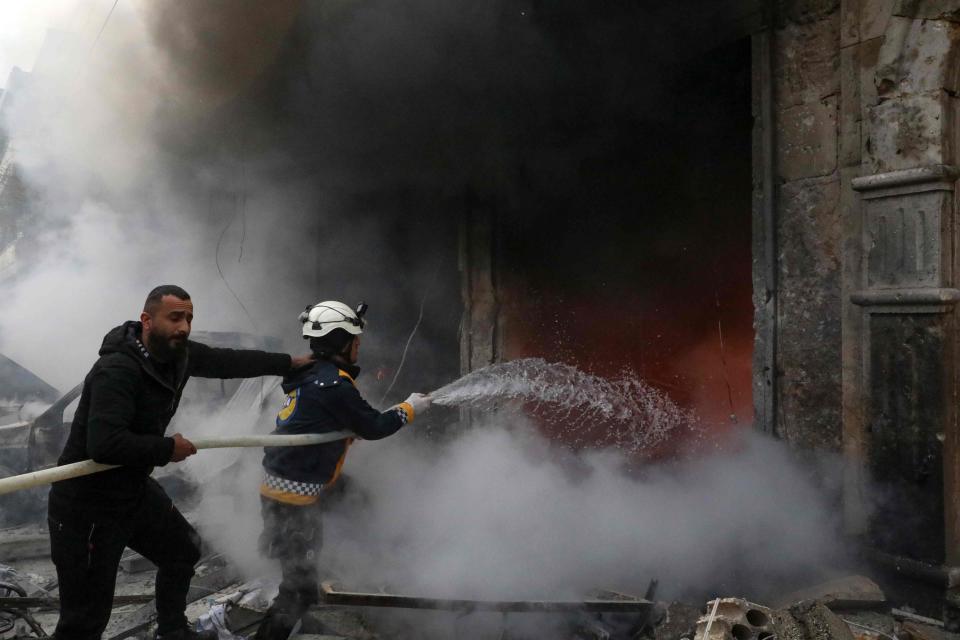‘An institution of torture’: Why the conviction of a low-ranking Syria regime official in Germany matters

It was one of the many peaceful political protests that erupted in 2011 against the Syrian dictatorship of Bashar Assad, this time in the Damascus suburb of Douma. Syrian General Intelligence Directorate officer Eyad al-Gharib was there, and he told German authorities he was stunned when a superior demanded he and other security officials open fire on what he described as non-violent protesters.
He claimed he did not shoot, but admitted he took part in efforts to arrest fleeing demonstrators and stuff them into buses. They were taken to the notorious Branch 251 of the General Intelligence Directorate, a security and prison complex often called al-Khatib, where they were subject to beatings, torture, and murder.
On Wednesday, Gharib, 44, was convicted of aiding and abetting crimes against humanity for his role in the Douma incident as part of a landmark court case that could pave the way for further prosecutions of alleged human rights abusers. His sentence by a judge in the city of Koblenz was relatively light — four years and six months, which means that with 25 months served and good behaviour, he could be free in months.
But crucially it marks the first time that a Syrian regime official was convicted of crimes against humanity for acts perpetrated during the country’s decade long civil conflict, which has pitted Assad’s brutal regime against peaceful protesters.
Human rights advocates say the sentence struck a balance between Gharib’s relatively low rank and the heinousness of the crimes to which he was a participant. His conviction was based almost solely on his own admissions to German investigators after he defected from the regime, fled abroad and eventually made his way to Germany.
“There’s so much suffering and death that has been caused through a system to which the convicted contributed,” said Patrick Kroker, of the European Centre for Constitutional and Human Rights, a Berlin-based advocacy organisation. “The deliberations that the court made took all aspects into account – the aggravating ones and the mitigating ones. He was part of an amazingly brutal system.”

Gharib is also serving as a witness in the case against senior official Anwar Raslan, a ranking Assad regime officer at Branch 251, accused in the torture of 4,000 and murder of dozens of Syrian people. Raslan, who has denied any wrongdoing, is expected to be sentenced in October in a case that will likely expand in the coming months.
For the victims of Branch 251, the Gharib verdict was bittersweet: “I expected that he would be acquitted,” Feras Fayyad, a Syrian filmmaker who was tortured and sexually assaulted at Branch 251 and testified in Koblenz against Raslan. “I wasn’t optimistic, because in Syria I had never experienced a justice process, and it didn’t know what it looks like.”
Mr Fayyad, who now lives in Berlin, said though he had a measure of sympathy for Gharib as a pawn of the Assad regime, it was tempered by his original choice to join the security forces.
“He took a decision to be part of the Syrian regime,” he said in an interview. “He took a decision to be part of this institution of torture. He knew what it was about. But he was looking for a position of power.”
The Branch 251 case marks the latest in a wave of prosecutions across the world using the legal principle of universal jurisdiction, in which courts anywhere can try suspects accused of gross human rights violations. Human rights campaigners have been closely focusing on the case.
The verdict really sends a clear message to Syrian security officers that what they’re doing in Assad regime prisons are crimes against humanity.
Sara Kayyali, a researcher at Human Rights Watch
“This really is a momentous trial and a momentous verdict,” said Sara Kayyali, a researcher at Human Rights Watch. “We’re hoping this is really the beginning of an opportunity for fuller justice for Syrians. The verdict really sends a clear message to Syrian security officers that what they’re doing in Assad regime prisons are crimes against humanity.”
At the same time, the measured sentence leaves a window for potential defectors and turncoats, encouraging them to betray the Assad regime and testifying against their superiors.
International human rights advocates also say the case established clear precedents.
Prosecutors painstakingly described the historical context of the Syrian uprising, which began as peaceful protesters inspired by revolutions in Tunisia and Egypt a decade ago. They recounted the widespread systematic attack on the demonstrations by Assad’s security forces, as well as the prisons and detention centres where protesters and dissidents were tortured, abused and left to die. They detailed the brutality of the security services as well as the detention centres. Evidence reviewed during the trial included photographs of thousands of alleged victims of torture that were smuggled out of Syria by an officer codenamed Cesar.
“Two-thirds of the reasoning in the case dealt with the overall situation, going from the very broad to the level of the individuals involved,” said Mr Kroker, “These findings will be coming into the record. These are findings that there are crimes against humanity in Syria. And this is something that will be of much use in other courts, certainly in Germany, but in other countries as well.”

In a note posted online, Anwar al-Bunni, of the Syrian Centre for Legal Studies and Research argued that the conviction was important because it established that Gharib “was part of an organised and systematic infernal machine with superior orders to arrest peaceful civilians, enforce disappear them, torture them, kill them and hide their bodies in mass graves in a very humiliating manner”.
The verdict resonated among Syrian exiles, many of whom fled the country after being subject to horrific abuse. On social media and in interviews they spoke of renewed feelings of hope that they would find some measure of justice and that their tormentors would not enjoy total impunity.
Neither of the two suspects, whose cases were separated earlier this month, have spoken in court. Mr Fayyad, whose 2017 documentary, Last Men in Aleppo, was shortlisted for an Oscar prize, said he had hoped that Gharib would have had the courage to stand up in court and speak about what happened at Branch 251 and his role in the violence.
“I was hoping for him to give a statement,” said Mr Fayyad. “I was hoping he would say that he was a victim, too, and that Bashar al-Assad used me and put me in a position where I had no choice. I apologise. I wanted him to say he was sorry, to say something. But he didn’t say anything, and that was a problem.”
Read More
Kurds end siege of government-held areas in northeast Syria

 Yahoo Finance
Yahoo Finance 